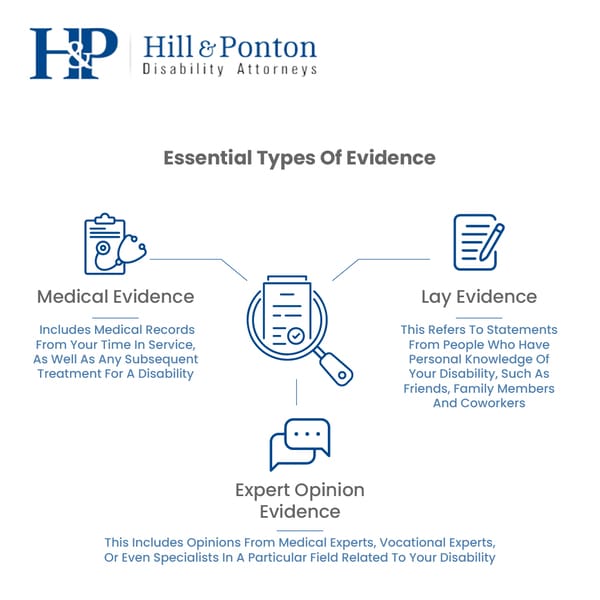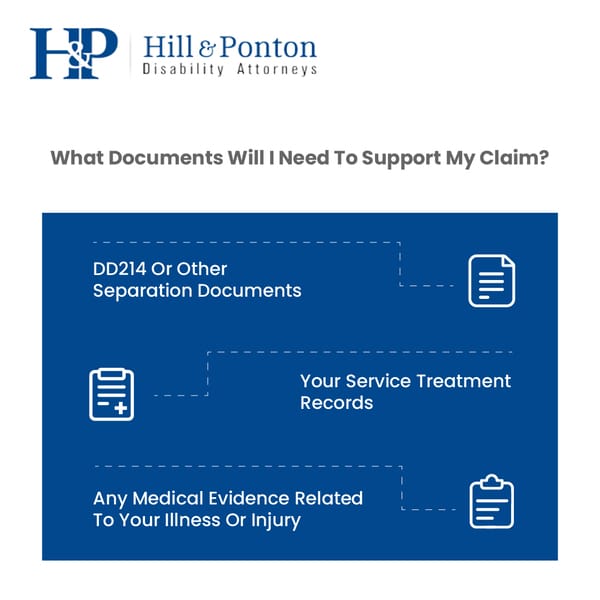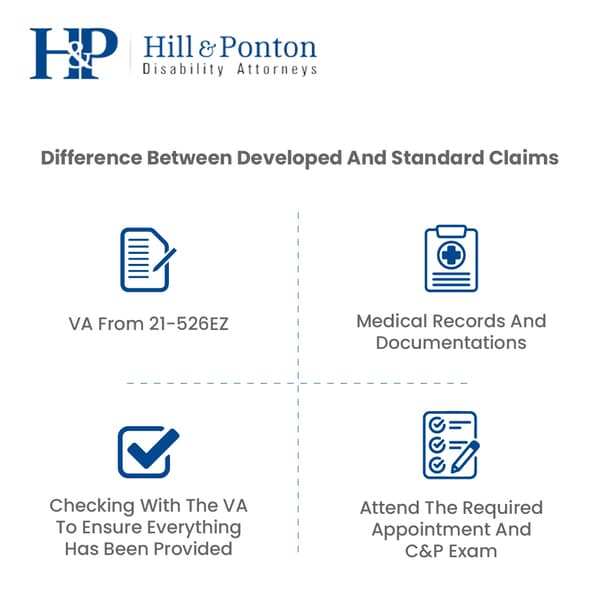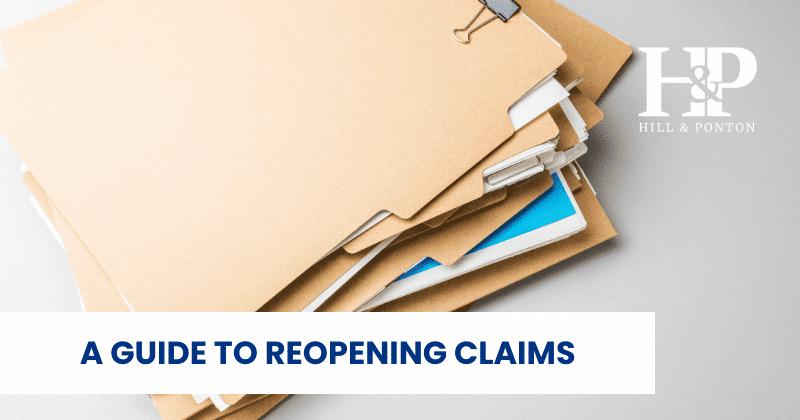As an organization who helps veterans who have honorably served our nation, we understand the challenges that come with navigating the VA disability benefits claims process.
We know how important it is to have the right knowledge and evidence to strengthen your case and ensure that your sacrifices are properly acknowledged and supported.
In this comprehensive guide, we delve into the realm of evidence—a crucial component that can significantly impact the success of our VA disability benefits claims.
Our goal is to empower you with the understanding needed to navigate this process effectively.
Together, we’ll uncover the key types of evidence recognized by the VA, equipping you with the tools to build a strong case and secure the benefits you rightfully deserve.
Think of evidence as the solid foundation upon which your claim rests.
It serves as tangible proof, validating your service-related injuries and conditions, and paving the way for the benefits you are entitled to.
However, before we get into the specific types of evidence, it’s important to grasp the basic concepts and terminology associated with evidence in VA disability benefits claims.
Join us on this enlightening journey as we uncover the power of medical evidence, the significance of lay statements, the weight carried by supporting documentation, and the role played by expert opinions and specialist reports.
Armed with this knowledge, you’ll be better prepared to build a compelling case that resonates with the decision-makers at the VA.

Understanding Evidence in VA Disability Benefits Claims
Evidence forms the backbone of your VA disability benefits claim.
It serves as the proof that substantiates your service-related injuries and conditions, demonstrating their connection to your military service.
The VA relies on evidence to evaluate the severity and impact of your disabilities, determining the level of benefits you may be eligible to receive.
Basic Concepts
To navigate the VA disability benefits claims process effectively, it’s essential to grasp some basic concepts related to evidence.
Here are the key points to understand:
Evidence refers to any information, documents, or materials that support your claim and provide proof of your service-related disabilities.
The VA recognizes various types of evidence when evaluating disability claims.
Some common types include:
- medical evidence
- lay statements
- supporting documentation (such as military service records)
- deck logs
- expert opinions
- specialist reports
Each type of evidence carries a different level of relevance and weight in the VA’s decision-making process.
Medical evidence, for instance, is highly significant, as it directly relates to your claimed disabilities.
Understanding the relative importance of different types of evidence can help you prioritize and gather the strongest evidence for your claim.
Will the VA help get my records for evidence?
The VA has a “duty to assist” veterans with obtaining evidence for their VA claim.
In addition to retrieving evidence, they will also notify veterans of what claim evidence they may need in order to have a successful case.
Compensation & Pension exams (C&P) are often a part of this.
Even with the VA’s assistance, be sure you are aware of the evidence you have collected and keep track of everything in detail.
The VA can and does make mistakes, and you are your own best advocate!
Did the VA Deny Your Disability Claim?
Let our team review your case today!
Get a Free Case EvaluationGathering Medical Evidence
In VA disability benefits claims, medical evidence plays a crucial role in substantiating your service-related disabilities and their impact on your daily life.
Let’s explore the key aspects of gathering strong medical evidence to support your claim.
Medical Records
Medical records serve as a cornerstone of your VA disability benefits claim.
They can include in-service medical records, private medical records, VA medical records, C&P exam results and other medical opinions.
These records provide comprehensive documentation of your medical history, diagnoses, treatments, and any service-related injuries or conditions.
Here’s what you need to know about gathering medical records:
- Importance of Comprehensive Records: Collect all relevant medical records, including those from VA facilities, private healthcare providers, military medical facilities, and specialists. These records should cover the period of your military service and continue to the present day.
- Requesting Medical Records: Contact your healthcare providers and request copies of your medical records. Be sure to include records from all relevant medical professionals, such as primary care physicians, specialists, therapists, and any VA medical centers you have visited.
- Organizing and Reviewing Records: Create a system to organize your medical records, ensuring they are easily accessible when needed. Review the records carefully to identify and highlight any information relevant to your claimed disabilities.
Private Medical Records
In some cases, you may get a private examination to further evaluate your disabilities and their connection to your military service.
A veteran can request their records directly from a provider, or if they sign a release form the VA can request them.
Nexus Letters
Nexus letters can be powerful evidence in your VA disability benefits claim, especially when establishing the connection between your current disabilities and your military service.
Here’s some useful information about nexus letters:
- Nexus letters are medical opinions provided by healthcare professionals that establish a link, or nexus, between your current disabilities and your military service. These letters can significantly strengthen your claim.
- To obtain a nexus letter, reach out to healthcare professionals who have treated you for your claimed conditions. Discuss the importance of a nexus letter with them and request their assistance in providing a well-documented letter that outlines the connection between your service and current disabilities.
- A strong nexus letter should include the healthcare professional’s expertise and qualifications, a clear statement linking your disabilities to your military service, and a detailed explanation supported by medical evidence.
By gathering robust medical evidence, including comprehensive medical records and obtaining compelling nexus letters, you can bolster your VA disability benefits claim
Lay Evidence
In addition to medical evidence, lay evidence can be a valuable asset in supporting your VA disability benefits claim.
Lay evidence consists of statements or testimonies from yourself, family members, friends, or fellow service members who can provide insights into the impact of your disabilities on your daily life.
These statements can be submitted directly to the VA, and are useful in cases where a veteran is documenting frequency of symptoms to request an increase in rating.
VA Form 21-10210 “Lay/Witness Statement” can be utilized to submit lay statements and buddy statements.
Lay Statements
Lay statements, also known as lay or buddy statements, are personal testimonies that describe the effects of your service-related disabilities on your daily functioning.
Here’s the facts on lay statements:
- Lay statements provide a unique perspective on how your disabilities affect your life. They can offer valuable insights into the severity, frequency, and limitations imposed by your conditions. The VA considers lay statements when evaluating the credibility and consistency of your claimed disabilities.
- You, as the claimant, can provide a lay statement to describe your firsthand experiences. Additionally, statements from family members, friends, or fellow service members who have observed your struggles and limitations can strengthen your claim.
- When writing a lay statement, be specific and detailed about the symptoms, limitations, and challenges you face due to your disabilities. Include information about how your conditions impact your ability to work, perform daily activities, engage in hobbies, and maintain relationships. Support your statements with specific examples and provide the contact information of the individuals providing the statement.
- Remember that lay evidence can cause credibility concerns. If you have conflicting information from multiple sources, it may hinder your case versus help, so be mindful when you are submitting all of your evidence.
Buddy Statements
Buddy statements, also known as “buddy letters”, are statements from other service members and carry weight in VA disability benefits claims.
These statements can provide firsthand accounts of incidents or events during your military service that resulted in your claimed disabilities.
Buddy statements add credibility and support to your claim by providing corroboration of the incidents or events that caused or aggravated your disabilities.
They offer a different perspective and can validate your service-related injuries or conditions
Fellow service members who witnessed or were involved in the incidents or events leading to your disabilities can provide buddy statements. They can testify to the circumstances, the impact on your health, and the continuity of your conditions since then.
Reach out to your former comrades and explain the importance of their statements.
Encourage them to provide detailed accounts, including:
- dates
- locations
- specific information about the incidents
Ensure that the statements are signed, dated, and include the contact information of the individuals providing them.
What kind of documents do I need to support my claim?
The VA requires certain documents to support all claims for disability benefits. You will need to submit or give the VA permission to gather the following:
- Your DD214 or other separation documents.
- Your service treatment records.
- Any medical evidence related to your illness or injury (doctors reports, X-rays, medical test results, etc.)

What should the evidence show to support my disability claim?
The answer to this question is highly dependent on the type of claim you are filing. A summary of evidence requirements for each type of claim is listed below.
Original Claim
This is the first claim you file for disability benefits. You will file a VA Form 21-526EZ.
In certain instances, the VA may conclude that there is a link between your military service and your disability, even if there isn’t any evidence to support it. This will apply to:
- A chronic (long lasting) illness that manifests to a compensable rating level within one year after discharge, or
- An illness caused by contact with contaminants (toxic chemicals) or other hazardous materials, or
- An illness caused by your time spent as a POW.
Increased Claim
A claim for more compensation for a disability than the VA had already awarded, usually because a service-connected issue has gotten worse.
You will need to submit current evidence from a professional or layperson (someone who is not a trained professional), or from yourself, that shows your disability has gotten worse.
New Claim
This is a claim to reopen a previously denied claim that is related to an existing service-connected disability
It is recommended to submit new and relevant evidence related to a previously denied condition that can show it is related to your active duty service time.
Secondary Service-Connected Claim
A claim for a new disability that’s linked to a condition that is already service connected.
It is recommended to submit evidence for the condition you are applying for and the information of the providers treating you for those conditions.
Supplemental Claim/Appeal Form
It is the same as a new claim, if done after 1 year from the rating decision, and is an appeal if done within 1 year of the rating decision.
What is the difference between a fully developed disability claim and a standard disability claim?
The VA offers an optional fully developed claim program to assist veterans in receiving a decision regarding their VA disability compensation, faster.
The term fully developed claim means you have provided all of the information the VA requires when making an approval or denial decision on a disability claim.
Here is the information you will need to submit to the VA for your claim to be considered a fully developed claim:
- VA Form 21-526EZ, The Application for Disability Compensation and Related Compensation Benefits.
- Medical records and other supporting documentation that provides a diagnosis of your condition and evidence of a link between your condition and your military service.
- Check with the VA to ensure that you don’t need to provide additional information to support your disability claim.
- Attend your C&P exam and other medical appointments as required by the VA.

The VA considers the following appropriate evidence for a fully developed claim:
- Medical records related to the condition in which you are filing
- Any military records that relate to your disability claim
- Medical records that you don’t currently have in your possession, but that the VA can request from a federal facility (such as a VA hospital).
If you feel that the VA needs more information to make a determination, you can include letters from fellow military service members, family, friends, law enforcement personnel, or clergy.
Is “Preparation for Notification” a good sign?
Preparation for Notification is the 5th step in the disability claims process. This is when you’re near the final stages of a VA rating decision: approval, denial or deferral.
At this point, you can expect to have a decision, possibly within as little as 30 business days.
The entire VA disability claim file (VA C File) gets sent to the VA Ratings Veteran Service Representative (RVSR), who will review the application and evidence. They will then recommend a decision.
Dependent Benefits
If you are seeking additional compensation for your dependents, there is specific evidence required to support these claims. When applying for dependent benefits, you must complete Form 21-686c.
Here’s what you need to know:
- Marriage Verification: To prove the existence of your spouse, you may be required to submit your marriage certificate. Additionally, any prior divorce decrees related to your spouse’s previous marriages may need to be provided.
- Child Verification: To claim benefits for children, you may be required to submit their birth certificates. Ensure you have these documents readily available to avoid delays in processing your claim.
Specific Evidence Needed for Claims
Post-Traumatic Stress Disorder (PTSD)
When you file a claim for service-connected PTSD, you will need to provide a specific type of evidence called a stressor.
A stressor is the event(s) in service that caused the veteran’s PTSD.
Military Sexual Trauma (MST)
When a veteran experiences a physical assault or battery of a sexual nature, or sexual harassment while in service, it is called military sexual trauma (MST). It is closely linked to PTSD and other mental health disorders.
In MST cases, the VA cannot argue that a lack of evidence of the incident is counted against a veteran’s claim, because not all cases are reported in service.
Instead, if there is no report, veterans can utilize other information like requests to transfer, performance evaluations and additional service records to show behavioral changes that resulted from experiencing the traumatic event.
Throughout this guide, we have explored the key types of evidence that can strengthen your claim and increase your chances of securing the benefits you deserve.
As you prepare to submit your VA disability benefits claim, remember to gather and organize your evidence effectively.
Highlight the most relevant and compelling information, ensuring that your supporting documentation aligns with the criteria and requirements outlined by the VA.
Take pride in the sacrifices you have made in service to our nation, and remember that you deserve the support and benefits that the VA provides.
Stay resilient, persistent, and assertive throughout the claims process, and never hesitate to advocate for yourself.




